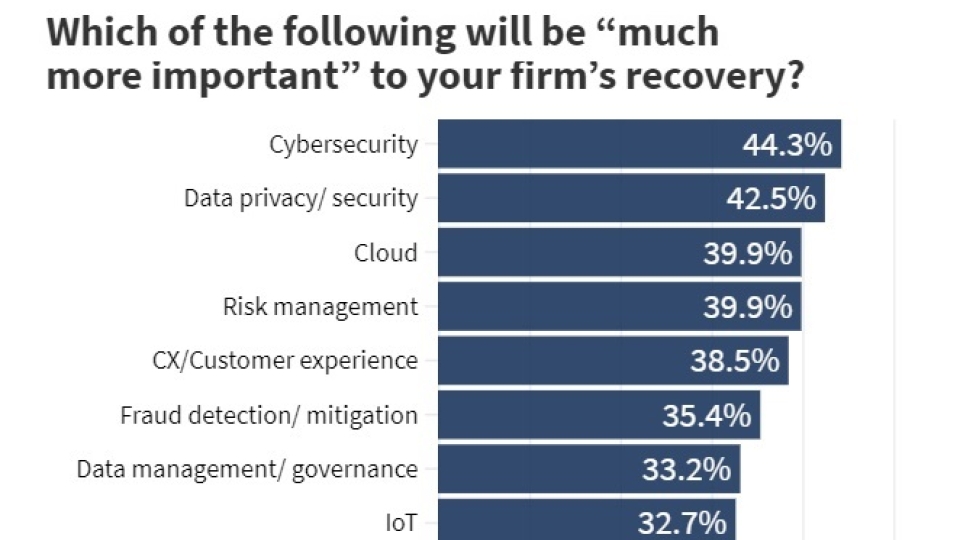
While teleconferencing and video platforms have been the obvious winner among technologies in the pandemic crisis, security and risk are also at the top of global executives minds. The Economist Intelligence Unit's new Global Business Barometer report – just a few weeks old - asked executives a series of questions and found that in terms of technologies, much of executives’ current focus is clearly on security and risk. Given a slate of options to choose from, forty-four percent of respondents see cyber security as becoming “much more important” followed by the related areas of data privacy at 42.5% and risk management at 39.9%. Cloud computing was tied with risk management at 39.9%.
At the bottom of the list were a few technologies being hyped before the pandemic. 5G, the latest generation of cellular technology, was only deemed to be “much more important” by 5.8% of executives surveyed and 41.6% answered that it was “somewhat less important” to their firm’s recovery. Faster wireless connections are a nice-to-have at the moment given that current 4G networks have so far proven sufficient for keeping the lights on.
Much of the global execs’ thinking will depend on their views of the future. Chris Clague, Managing Editor Asia & Global Editorial Lead, Trade and Globalisation, EIU tells IT Europa that there was an appreciable improvement in the sentiment but it is a long way from anything positive. “Global executives are very pessimistic about the next three months in the core barometer readings. Given the global situation, it is doubtful if there will be much improvement.”
The pandemic potentially accelerates trends already existing, he says. The technology industry is optimistic by nature; in the survey, the tech companies are less pessimistic than other industries. “I think the sector’s optimism is justified in that more of us are now dependent on technology to an extent that is greater than expected. We have become much more reliant on it faster than otherwise – something taking years to changes is now moving in months or weeks.”
The crisis also changed attitudes to co-operation: apart from technological adaptation, executives also see opportunities for more collaboration inside and outside of their firms. Collaboration with employees is the natural starting point and 25.7% of executives said the relationship would become “much more collaborative” while an additional 30.8% said it would become “somewhat more collaborative”. That was topped, however, by collaboration with partners which 26.8% of respondents deemed “much more important”. Executives from the machinery and other industrial sectors (37.1%) and retail, e-commerce and consumer goods sectors (32.7%) showed the most enthusiasm for deepening relationships with their partners.
On cybersecurity he says: “If you are a company that is more reliant on employees working remotely – in banking, media etc, cybersecurity becomes harder than when everyone is in the office. So it is more difficult, which puts it on executives’ radars now.”
On the wider picture, he says: “The WTO (World Trade Organisation) has put out scenarios for 2020 for global trade declining by -13% to -30%. I tend to be less pessimistic – supply chains are being disrupted, but most countries are not able to fund alternatives locally, so they will recover.”
The services-based economies in the western world are 70% of the global economy- manufacturing is just not as important. As the developing world moves up the value chain, this may become a problem as the advanced economies try to move operations back home either through automation or re-shoring, but for most it is not possible, with the limited local labour forces and raw materials availability, so there will may short term supply checks, but globalisation and trade in physical goods will recover substantially.”


